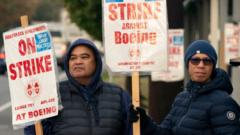Boeing workers are set to consider a recently revised offer aimed at concluding a strike that has persisted for seven weeks, marked by increased tension and financial uncertainty for the aviation giant. Under the new offer, workers could see a pay increase of up to 38% over four years, alongside a one-time bonus of $12,000 if an agreement is reached. The IAM union, which had previously rejected two other proposals—one offering a 35% rise and the other a higher pay increase of 40%—is encouraging members to vote on the revised offer on November 4.
The walkout, which began on September 13, has brought Boeing's production to a standstill and exacerbated financial troubles within the company. In the past quarter, Boeing's commercial aircraft sector reported a staggering $4 billion in operating losses. Additionally, the company is facing the possibility of credit rating downgrades, which would complicate its financial recovery efforts, particularly as it aims to raise over $20 billion through share sales.
Boeing’s management has publicly expressed optimism about the proposed deal, urging employees to consider the benefits that could come with acceptance and to participate in the upcoming vote. The latest offer also introduces changes to retirement plans, signaling a strategic shift in how the company is managing its workforce's future.
Amid these negotiations, Boeing is moving forward with plans to reduce its workforce by approximately 17,000 positions, with notifications expected in mid-November. This round of layoffs follows a series of challenges for Boeing, including recent operational mishaps that have undermined its reputation in both commercial and space ventures.
As the strike continues, Boeing strives to stabilize its operations while addressing the demands for better worker compensation and conditions, marking a critical juncture for both the company and its employees.
The walkout, which began on September 13, has brought Boeing's production to a standstill and exacerbated financial troubles within the company. In the past quarter, Boeing's commercial aircraft sector reported a staggering $4 billion in operating losses. Additionally, the company is facing the possibility of credit rating downgrades, which would complicate its financial recovery efforts, particularly as it aims to raise over $20 billion through share sales.
Boeing’s management has publicly expressed optimism about the proposed deal, urging employees to consider the benefits that could come with acceptance and to participate in the upcoming vote. The latest offer also introduces changes to retirement plans, signaling a strategic shift in how the company is managing its workforce's future.
Amid these negotiations, Boeing is moving forward with plans to reduce its workforce by approximately 17,000 positions, with notifications expected in mid-November. This round of layoffs follows a series of challenges for Boeing, including recent operational mishaps that have undermined its reputation in both commercial and space ventures.
As the strike continues, Boeing strives to stabilize its operations while addressing the demands for better worker compensation and conditions, marking a critical juncture for both the company and its employees.


















